- Home
- BobA. Troutt
Beyond The Truth Page 2
Beyond The Truth Read online
Page 2
*****
Beyond the Truth
Gavel
It was late July of 1989 and the weather hung hot and heavy over the skyline of Atlanta. Latisha stood on the balcony of her downtown apartment, waiting to face the day. She could hear the early morning traffic below, and in the distance, a helicopter flying nearby. As she turned to go back in, she heard the radio announcer calling for a high of 98 degrees. She left the patio door open slightly, allowing a warm breeze to flow through. The draft twisted about her bare ankles, ruffling the bottom of her nightgown. She went into the kitchen and poured a cup of coffee.
Latisha sat on the edge of the couch drinking her coffee. Her body was covered in a light sherbet gown that lay flowing down her waistline. Her long, black, slender legs showed through the twin splits in her gown, and her long black hair was tucked behind her ears, accentuating the shape of her face. She looked up and saw Michael standing in the doorway.
She smiled. “Coffee?” she asked.
“Sure,” he replied.
They sat for a few minutes and talked.
“I want to go downtown this morning and go by the courthouse,” he said. “What time is it?”
“It’s 8:15,” Latisha replied.
“We‘ll have to hurry,” he warned.
“But I’m not dressed.”
“Hurry up and get dressed,” he said. “I’ve got to be there by 9:00. You know the traffic is…”
“Okay,” she replied. “But I don’t see what the big hurry is.”
“Come on, baby,” he whispered. Then he took her in his arms and kissed her. Slowly he moved his hands around her waist, and pulled her up to him. “Please,” he said.
“Okay!” she agreed. “This time!” Then she kissed him back.
Hurriedly, they got ready and made their way down to the parking garage. Michael seemed a little quiet and more to himself than usual. He had a lot on his mind. The traffic was terrible; he had been right. They made it to Interstate 75, looking for the 285 bypass. The sixteen lanes of traffic were packed. The traffic came to a standstill every couple of miles. Michael didn’t have much to say except for cussing the other drivers to hurry up. Latisha was thinking about her life.
She was born Samantha Bridge, and was originally from Savannah. She was gang raped when she was a teenager; it was something she never got over.
When she moved to Atlanta six years ago, she started an escort service using a few local girls. “Rain” was her street name.
About a year later she met Gibbs in a one night stand, but it turned into a business deal. Gibbs was the head of the Delmottai Family in the south Atlanta branch. His brother, Gardner, was the head of the family in South Miami. The two brothers were top of the line mobsters in the southeast in their day. After Gardner died, Gibbs took it all over. That’s when he began to change. A barrier formed between him and Latisha.
Michael Beckett was the family’s bookkeeper. He kept up with everything and was paid very well. He was a genius in his own way. Michael was in some kind of special force with the government when he was young. He never talked about it. After the barrier went up between Gibbs and Latisha, she began seeing Michael in secret.
Suddenly, the car horn wailed as Michael yelled out the window, “Get out of the way!” The driver in front of them cussed, flipped him off, and took off. “The stupid idiot,” mumbled Michael as he returned the bird and his tires squealed.
Latisha didn’t know what to say. Michael seemed to change so quickly; he was edgy and uptight. “Do you want me to drive?” she asked.
“No,” he replied. “We’re about there, Latisha, hang loose, baby. Keep it together, it’s almost party time. Trust me!”
They pulled up and parked about a block away from the courthouse. “Michael, what are you doing?” she questioned.
“Hush, baby,” he said as he softly kissed her on the lips. “We can walk from here.”
“Walk!” she shouted. “Why are we walking when we can park at the courthouse?”
“We need the exercise, baby,” he replied. “Come on now and trust me.”
As she got out of the car she grabbed him by the arm. “Michael, is something going on?”
“No, girl, everything is cool,” he replied. Then he kissed her again, slapped her on the butt and said, “Let’s move along, baby, we’re almost there.”
As they crossed the street and walked toward the courthouse, Michael stopped at a newspaper stand and bought a paper. Next they walked toward the bottom of the courthouse steps. The building was huge, with six stories and a basement. The place was busy, people moving in and out, cabs pulling up, traffic backed up, and on top of all that, it was a hot muggy morning. Latisha started to ask Michael why they were there when she noticed him looking at his watch. She thought back to the many days she had spent in the courthouse. She remembered how the usual hearing began.
“Hear ye, hear ye, all rise, Honorable Judge Edward Harville presiding of the Commonwealth State of Georgia,” the bailiff would state. “You may be seated.”
The judge would look to the lawyers and ask, “Are we ready to proceed?”
They would agree. Then Judge Harville would pick up the gavel and slam it down on the desk – another typical day in court.
Latisha was suddenly startled from her thoughts. Boom! The courthouse exploded and people started running out, screaming and crying as fire and smoke engulfed the building.
“Oh my God,” she cried as they stood outside and watched a giant fireball shoot up in the sky. Pieces of the courthouse began to fall everywhere. Quickly, Michael and Latisha took cover. In a matter of minutes the police and fire departments had surrounded the building. Sirens screamed as ambulances raced to the scene.
“My God, Michael,” Latisha cried. “What happened?”
They watched the building burn as injured people were carried out.
“Michael, Michael,” she cried but he didn’t say a word.
Black smoke filled the already overcast sky as the smell of the explosion torched the hot air. Latisha’s eyes were filled with tears as so many hurt and dead people were being removed. Then suddenly the police came by, roping off the crime scene. They asked Latisha and Michael to step back. Michael folded up his paper, placed it under his arm, and took Latisha by the hand as they headed toward the car. When they got to the car, she stopped and asked him, “What is going on?”
He said, “The courthouse has just blown up, duh.”
“Did you have anything to do with that?” she asked.
“Latisha, girl, you know I…. No, I didn’t,” he replied. “Why would you say such a thing?”
“Why did you want to come down here?” she questioned him.
“I was supposed to meet a couple of guys, but they never showed up. Hey, baby, look at me, it’s Michael. You know me better than that. Come on, girl,” he replied.
“Are you lying to me?” she asked.
“Would I lie to you?” he replied.
She looked at him and said nothing. She turned and got into the car. As they drove off, sirens haunted the city as a huge black cloud hovered over the courthouse. On their way, they passed ambulances and police cars racing to the scene. She turned to look at Michael. He turned to her, placing his hand on her leg.
“It’s going to be alright,” he assured Latisha.
The TV was filled with the news of the bombing for the next few weeks; Atlanta was in an uproar. There had been eighty-three people killed in the explosion and the count was rising. Hundreds of people were injured. The FBI had been called in to take over the investigation. People were placing wreaths for their loved ones at the shell of the building that was left. The news reporters were stating that this was the worst tragedy in Georgia’s history. While the world prayed, the FBI searched the rubble for anything, any clue that could give them some answers.
“What are you watchin
g, girl?” asked Michael. “Are they still talking about the bombing?”
“Yeah, it’s awful,” she replied, “all those innocent people dead. Can you imagine their families?”
“You do know that Gibbs will be back from Miami this evening, don’t you?” questioned Michael.
“Yeah, I know—so?” she replied.
“I’ll meet you at our apartment in a few days,” Michael said. “I’ll let you know when. I need to keep a low profile for a while.”
“Gibbs thinks I’m seeing someone else,” she said.
“Does he know who?” Michael asked.
“No, I don’t think so,” she replied. “But he is asking questions about my coming and going.”
“Be careful, baby,” warned Michael. “We don’t want the cat to get out of the bag.”
“Yeah,” she answered.
Agent Benjamin Calloway of the FBI appeared on the TV.
“Agent Calloway,” asked the reporter, “have you come up with any leads?”
“Well, nothing concrete,” Calloway replied. “But we do have something we are looking into.”
“Do you think it was a terrorist attack?” questioned the reporter.
“No, we are pretty sure it’s not that,” replied Agent Calloway. “It appears it may be a single bomber with some accomplice. It’s just too early to tell.”
“What do you think, Michael?” Latisha asked. “Who would do such a thing?”
“There are a lot of sick people out there in his world,” he stated. “It could be anybody. It’s sad that innocent people were killed to get one or two. But that’s the way it works sometimes I guess.”
“What do you mean?” she asked. “What one or two?”
“Oh, nothing, girl, I was thinking out loud. I’ll see you in a few days,” Michael said.
Then he reached for her and kissed her, gently rubbing his hands up and down her whole back side. “You still my girl?” he asked.
She slowly looked up at him, “Yes, I am,” as she laid her head on his chest.
Early the next morning, there was a knock at Latisha’s door. When she answered, it was Gibbs.
“I heard you were back,” she said as he stepped in and closed the door.
“You don’t seem so surprised,” he said.
Then he grabbed her, kissed her hard, and jerked her by the hair of the head.
“Did you get what I wanted?” he yelled.
“No, not yet,” she replied.
“When are you going to get it?” he asked. “You’re running out of time.”
“Soon,” she said, “soon. I’m working on it. Michael is no fool.”
“I want that book soon,” he threatened, “or your bed partner is going to have a little accident.” Then he shoved her away. As she fell to the couch he boasted, “Remember I can destroy you.”
Then Gibbs left and Latisha was alone. She was torn on what to do. Michael kept the books for the mob, but secretly he made a second set. Gibbs found out about the book and was afraid Michael would use it against the family and destroy them. Gibbs was blackmailing Latisha to find the book. Gibbs and the family were afraid to approach Michael because they knew he could turn the state’s evidence against them. The FBI was hot on the Delmottai family anyway. They didn’t need any more heat, but when the right time came they would handle Michael permanently. Latisha was torn between the two. But no matter what, she had to look after herself first.
A few days later, she heard from Michael. He came by and picked her up. They stopped off and got a bite to eat and then they headed downtown. Michael didn’t have a lot to say.
“I wish it would rain,” he said.
Latisha was praying he hadn’t found her out. He asked if Gibbs had come by. She told him he had come by the other day. He asked her what he wanted. She told him that he came by to let her know he was back in town. Then suddenly, they pulled into the hospital parking lot.
“Michael what are we doing here?” she asked.
A hospital employee wheeled a man out in a wheelchair. Evidently he was being dismissed. She watched as he got into the passenger seat of an old Buick. Latisha then heard Michael talking to himself; no, he was talking to someone through an earphone microphone.
“He’s pulling off,” he said. Then they followed.
“What is going on, Michael?” she cried. “First the courthouse, now this!”
“Shhh, baby, trust me, okay?” he asked. “Just sit back and enjoy the ride.”
She was afraid. She didn’t know which one was worse, Michael or Gibbs. They followed about two or three car lengths behind the man. They traveled down Peachtree Street, across town toward the interstate. By the time they reached the corner of Gammons and Ferguson, they were right behind the Buick. There was one car in front of it when they reached the red light. Latisha couldn’t help noticing a man working on the light pole beside the road. Then she heard Michael talking to someone, again.
“Okay, Skip and Gulley, he’s almost right above you,” guided Michael. “Kill the light.”
Latisha didn’t say a word. She watched and listened. He was telling someone that the man’s car was right above the manhole. The light seemed to be stalled. They sat there for a few minutes. Then she heard Michael say, “Let’s move. Move it. Good job, I’ll be in touch.”
As the light changed they followed the Buick from a distance, making their way onto the freeway. Not far down the road, Michael pulled a small box with a light and a button on it out of his pocket.
“Watch this, baby,” he said as he pressed the button. Boom! The car they had been following exploded, flipping over and over down the freeway into a roll and then stopped upside down. Boom! It was engulfed in flames.
Latisha cried out, “Michael, Michael, what have you done?”
There were wrecks happening everywhere. Pieces of cars scattered all across the freeway. People crawled out of their cars as sirens once again filled the air. Latisha didn’t know what to say. She didn’t know what to do. She was so scared. Who was this monster she had been sleeping with? Quickly, they took the next exit and disappeared into the traffic.
“I want to go home,” Latisha cried.
“But, baby,” he said.
“Michael, now,” she replied. “Don’t touch me. You’re crazy.”
“Oh, come on, Latisha,” he said, “don’t you think this is a lot more fun than trying to find my book?”
She didn’t say a word. She froze.
“Okay, girl, I’ll take you home,” he replied.
“How did you know?” she asked.
“I bugged your apartment,” he laughed.
She took a deep breath, and her hands were trembling.
“What now?” she asked.
“Now, I’ll take you home,” he replied.
A few days later at the federal building, Agent Calloway, head of operations in the courthouse bombing case, had put together a theory on the case. Calloway and his crime team had concluded that the bomb was hidden under Judge Harville’s bench. When the judge struck the gavel, it triggered the explosive. After going over employee records, it appeared that the bomber, who they didn’t know yet, took a job as a custodian at the courthouse a few weeks prior to the bombing. From the residue found on one of the custodian carts, the culprit must have smuggled the explosive in a little at a time, possibly in a lunch box. As time grew near, he assembled the bomb at work and concealed it behind a fake wall under the judge’s bench. A custodian was a perfect position, because they had access to almost everywhere in the courthouse. No one would question a custodian cleaning a judge’s bench; that was his job.
“But what was the motive?” asked one officer.
“And who is this master mind?” asked another.
“We don’t know yet,” explained Agent Calloway, “but there is something else. We believe the courthouse bombing and the bombing on the freeway are c
onnected somehow.”
“Do you think it’s the same bomber or a copycat?” asked an officer.
“It could be either. We’re working on it,” Calloway said.
“Are there any suspects?” asked another officer.
“The courthouse employees’ ID photos give us a little insight. But we are afraid the bomber may have worn a disguise.”
Agent Gilliam walked in with a file and handed it to Calloway. After carefully reading it, he briefed the team on the updated report.
“The explosion specialist has reconstructed the bombing,” stated Calloway. “They found that the force of the gavel caused a hair spring trigger to set off the explosives that lined the judge’s bench.
“The car bomb was placed under the car—possibly between the time he left the hospital and got on the freeway, maybe even at the hospital. The car bomb was what they call a paper bomb because it is so thin, yet carries a big explosion. Packed between two pieces of coated paper with nitrogen, a series of small wires are connected together with microchips acted as dynamite caps. The bomb was placed under the vehicle with magnetic tips flat against the bottom, unseen to anyone as the vehicle moves down the road. It was triggered by a sound frequency that fuses the microchips with the nitrogen, creating the explosion. It sounds very complicated but can be made fast and at home in your living room.
“Also, the report includes the last five years of Judge Harville’s cases; we will focus on the ones that involve District Attorney James Russell Taylor, the victim in the car bombing. There were several cases through the years. We are handing them out to you. Do your homework. We’ll have another briefing tomorrow. If you run across anything, bring it to us immediately. Time is of the essence,” he said.
The investigation went on. Every agent and police officer in Atlanta was searching the streets, putting the word out if anyone knew anything to let them know. The bombings had stopped, thank the Lord, and Michael had disappeared.
The temperature was steadily climbing each day. It reached 99 degrees. The heat was taking a toll on every one.
It had been weeks since Latisha had heard from Michael. She really didn’t know if she wanted to. Gibbs was pushing her hard and riding her back about the book. She hadn’t told him that Michael knew about the double cross. She was afraid Gibbs would kill her so she decided to keep it to herself.
Finally, the FBI received a break. From the court records and transcripts of a trial they learned that Judge Harville had tried a rape/murder case of an eighteen-year-old girl in 1986. She had been assaulted by Dewayne Bartley, a two-bit hood with connections to the Delmottai family. Bartley was doing some small time work for the Delmottai family.
Michael Beckett’s daughter was walking home from the library. About two blocks from her house, Bartley pulled up beside her, placed a rag full of chloroform over her mouth, and forced her into his car. Then he drove across town to an abandoned warehouse owned by the Delmottai family.
When she started to come to, she began to scream. Quickly he started hitting her, beating her up beyond recognition. Next he raped her, not once, but twice. She died after the beating. They found his hair particles and traces of his semen on her body; her blood residue was found on him and his clothes. A reasonable without a doubt case, or so everyone thought it was. It appeared to be open and shut but they let him walk. He appeared to have a solid alibi with a crowd of people to back it up, influential people. Because of a legal technicality the girl’s father, Michael Beckett, swore he would get even. They had to remove him from the courtroom.
“Beckett, Michael Beckett, where have I heard that name before?” asked Calloway. “Oh, yes, ain’t he the bookkeeper for the Delmottai family?”
“I believe you’re right,” spoke up Gilliam, Calloway’s partner. “Isn’t that a strange situation?”
“Whatever happened to this Dewayne Bartley?”
“He disappeared after the trial. The word out on the street,” said Gilliam, “is that the Delmottai family sent him out of town to take the heat off the situation.”
“I want everything you can find on this Beckett guy, ASAP! Put out an APB on him, and let’s bring him in for some questioning. See if you can find Dewayne Bartley.”
South of Atlanta stood the old civil war mansion of the Delmottai family, the Sleeping Willows Estate. It stood four stories tall, spanned 12,650 square feet, and had fifteen bedrooms, two kitchens, a pool, a golf course, and a gym with indoor bowling and racquetball. The outside was enhanced with a lake, a circle drive lined with twenty-eight weeping willows from the entrance to the house, three fountains, a twelve foot fence, and high tech surveillance.
Latisha was on her way to the mansion. When she arrived Gibbs was waiting outside for her.
“Now there’s my favorite girl,” said Gibbs.
“Hello, Gibbs,” she replied.
“Come here, baby,” he said. “Let me give you a hug,” he said.
“You stay away from me,” she cried. “I want out of this crazy mess. Michael has disappeared, probably left Atlanta.”
“Oh, he has,” said Gibbs.
“I don’t know where he is or where the book is,” she insisted. “I want out.”
Quickly Gibbs grabbed her and slapped her. “Before you go, let’s have a little ride for old times’ sake.”
She tried to fight back, but he slapped her again and grabbed her hair and twisted her arm. Then he forced her into the house to a side room where he raped her and beat her. She cried and screamed. She begged him not to. She fought back with all she had but he was too strong for her. Then he grabbed her by the neck and picked her up and shoved her out into the hallway. She hit the wall first then the floor. Latisha didn’t know what to do. She had never seen him like this.
“Get out of here,” he screamed, “you whore! I’ll find the book myself!”
She gathered her things and ran through the house crying.
She jumped in her car. As she passed the last willow down the drive she knew it was time for her to leave Atlanta. She raced back to her apartment. When she got there, there were two men waiting for her outside. She eased out of the car as they approached her.
“Latisha Bridge,” one of them said.
“Yes, that’s me,” Latisha replied.
“I’m Agent Calloway and this is Agent Gilliam, FBI. We want to ask you some questions about a Michael Beckett.”
They looked her over. She was a mess.
“You look like you had a pretty rough night, Miss Bridge. Who did this to you?” asked Agent Gilliam.
“Never mind that,” she replied nervously. “How can I help you? How is it that I’m supposed to know this Michael…uh, what did you say his last name was?”
“Beckett,” replied Agent Gilliam. “We understand you know him very well.”
“Really!” she replied. “I really don’t know what you mean.”
“Have you ever heard of an escort service named Night Angels, the Delmottai family, Gibbs, and possibly the bombings that are taking place around Atlanta?” asked Calloway.
She didn’t say anything. “I want to see a lawyer,” she demanded.
“There’s no need for that,” said Calloway. “We want your help.”
“My help?” she cried. “Are you crazy? Do you want to get me killed? These guys are crazy!”
“Hold on, Miss Bridges. We want you to help us find Michael Beckett,” replied Calloway.
“You want me to be an informant,” she said.
“In a roundabout way,” interrupted Gilliam.
“I can’t find him,” she replied. “I don’t know where he is. He’s gone, disappeared. He’s probably not even in Atlanta.”
“We think he is,” spoke up Calloway, “and we believe you can find him. He will be getting in touch with you some time or another.”
“So you want me to fish him out in the open. What’s in it for me?�
� she asked. “What do I get, a hero’s plate to hang on my wall?”
“You have a choice of two things,” replied Calloway, “Spend the next few years in prison, or be relocated with a new name, new life, and a new start.”
“I don’t know,” she said, “let me think about it.”
“Let me know,” replied Calloway, “within the next twenty-four hours.”
Then they started to leave.
“Wait a minute,” she said. “I’ll do it. I’ll see what I can do.”
“We’ll be in touch,” they replied.
Back at headquarters Calloway received an update on Beckett. It appeared that Beckett had no previous arrest or record. His military file showed that he was in the Special Forces and was a top class demolition expert, one of the best. Calloway paused for a minute.
“We just got a tip that Beckett has an apartment on the eastside. Here’s the address, Georgia Towers, 4107 Twin Lane,” said Gilliam.
“Let’s get a stakeout over there on the double,” instructed Calloway. “Oh, by the way, what do we have on the Delmottai family?”
“Got it right here,” replied Gilliam. “A whole file—racketeering, money laundering, murder, prostitution, gambling, bribes, conspiracy, need I go on?”
“No, that’s good,” replied Calloway. “Let’s find this guy.”
Meanwhile, Gibbs was also searching for Michael Beckett. He wanted to find him before the Feds did. But after trying their resources, he could not be found. Gibbs thought Latisha must be right. He must have left Atlanta. But where would he go?
“Let’s make calls to some friends in the other cities and see if he turns up there. Wait a minute,” said Gibbs to the others. “I have a better plan. Let’s lay low for a while and let the Feds do our work for us. We’ll follow them around and when they have him, we’ll take him.”
While Gibbs was waiting and the Feds were working, Michael dressed as a homeless man. He was dressed in a pair of wrinkled dark blue pants and a wrinkled work shirt with the name Bubba on it. He had a stubby beard and had his long hair tucked in under a ball cap. He wore wire rim glasses with a piece of scotch tape around the left earpiece. He rented locker #407 at the bus station downtown, close to the federal courthouse. He placed a package in it, and then left. It was addressed to Georgia’s Federal Attorney’s Office, Federal Building, 1274 Peachtree Street, Atlanta, Georgia. The return address read only “Bones.”
Michael roamed around Atlanta disguised, a trick he learned in the Special Forces. Back at the station, one of the police informants told the Feds that there were two guys working with Beckett, Skip Brown and Gulley Simons, both from out of town.
“Did you get a description of these guys?” asked Calloway.
“Yes, we got them,” replied the officer.
“Good work,” praised Calloway. “Let’s get an APB out on them.”
“Sir,” interrupted the officer, “There’s something else.”
“What’s that?” said Calloway.
He said, “There are some dirty cops in the police department working with the Delmottai family.”
“Okay, I see,” he replied. “We’ll check it out. By the way, what’s this informant’s name in case I want to talk to him again?”
“I don’t know his real name,” said the officer, “but he goes by the name Bones. He’s a homeless man.”
“Good job, officer,” encouraged Calloway. “Gilliam, have we had any luck with the stakeout?” he asked.
“Negative,” replied Gilliam.
“Keep me informed,” ordered Calloway. “Have we heard anything from Beckett’s girlfriend?”
“She said she hadn’t heard a word from him. But she did say one of her girls went out with a guy who looked like him, but she said it wasn’t him,” replied Gilliam.
“How does she know?” asked Calloway.
“Latisha knows. Believe me, take my word,” replied Gilliam.
“Well, keep on it,” commanded Calloway.
A massive manhunt was put out in Atlanta for Michael Beckett, Skip Brown, and Gully Simons. A few days later, Latisha called the station to talk to Calloway. She told him that Michael had told her that he would be at their apartment Friday night at 9:00, that he would meet her there. He wanted to see her.
“Did he say anything else?” questioned Calloway.
“No, he didn’t,” she replied.
On Friday Calloway sent in reinforcements, snipers and all. “We got him in our trap, men,” boasted Calloway to the team in a briefing. “We want him alive if possible, but we will take him dead if he doesn’t want to cooperate. Stay on your toes, men, look sharp, and be alert,” warned Calloway. “This guy is not your run of the mill thug.”
The clock ticked, the hours passed, and the swat team and others had all but moved into position. Hearts throbbed, hands sweated, and all eyes shifted about and watched.
“Do you see anything?” Calloway whispered into his walkie-talkie.
“Not yet, sir,” replied an officer. “But wait, sir, I can see some movement in the room. It’s dark, but there’s someone in there. I can’t tell if it’s Beckett or not.”
In a few minutes the light came on. There was someone sitting in a chair in front of the window.
Suddenly the officer got a good look at the other guys. “It appears to be Skip Brown and Gulley Simons, sir,” he reassured them.
“Okay, men, she should be here soon,” said Calloway. “Keep alert.”
Time passed, all was quiet, when all of a sudden a voice came across the walkie-talkie, “Someone is coming, sir.”
The men gripped their triggers and wiped the sweat from their eyes. The tension was growing.
“Wait, wait a minute,” the officer replied. “It’s only a homeless man.”
“Get him out of there,” said Calloway.
The officer motioned for the man to get back, but the man didn’t understand, so the officers eased over and pulled him back. The man quickly went over and hovered down by some trashcans, afraid to move.
“There she is,” said Calloway. “She’s late. Give her time to get in and back out, then we move in.”
As Latisha made her way into the building, the FBI waited on pins and needles. Calloway wondered what was taking so long.
“I see her, sir,” said one of the snipers across the street in the other building. “She just now walked in.”
“Okay, men, as soon as she is out of the building, move in,” commanded Calloway, “on the double.”
In a few minutes she turned and went out the door. At the same time the SWAT team began to move. As her feet hit the ground outside, the team kicked the door in at the apartment. Gun fire opened up from both sides. When the shots were over the lieutenant gave a report. Skip Brown and Gulley were dead, along with two officers. A man tied in a chair in front of the window was dead also, but it was not Beckett. About that time they started hearing a tick-tick, tick-tick.
“It’s a bomb!” screamed the lieutenant.
Quickly everyone scrambled. But it was too late. With a Boom, the apartment exploded, blowing windows out everywhere. As a big ball of fire shot up, the building exploded into a gigantic ball of light, lighting up the whole block.
“Oh my God,” cried Calloway.
As the team rushed to help the injured the sirens sounded again throughout Atlanta. Ambulances, fire trucks, and police cars were immediately on the scene. A deep black smoke smothered the building as they tried to evacuate the tenants. Everyone was helping, people were crying out. The windows in the building across the street were all blown out. There was glass everywhere. Calloway stood speechless in the background. In the confusion and the chaos he watched the building go up in flames. The homeless man came up to him and asked him for a light. Calloway replied back, “I’m sorry, I don’t smoke.” As the homeless man started to leave, he bumped into him. “I’m sorry,” he said.
“That
’s alright,” replied Calloway.
Then the homeless man disappeared into the alley. “The heat is terrible,” said Calloway as he stepped in to help the victims.
The night lingered on as only an empty shell of a building stood. Smoke lingered about the wet debris as the smell of death haunted the city of Atlanta once again. As the last of the smoke smoldered over the rubble, night rested on Atlanta. Life went on as the screams of the sirens tainted the streets of the city.
It was late at the station, and Calloway rested at his desk trying to put the pieces of the case together. He searched for his pen to jot down a few notes when he suddenly reached into his pocket and pulled out a piece of paper. Carefully he opened it, and found a list of names of six crooked cops on the payroll of the Delmottai family. The note was signed by Bones. Then he remembered the homeless guy that asked for a light. Carefully, he looked over the names and spent the rest of the night working on the men on the list.
A week later all was still calm. The police had searched the city with a fine tooth comb. Nobody had seen or heard a thing. It was like the bomber was a ghost. They believed he was probably hiding out in the underground, but luckily there had been no more bombings.
By the end of the week, Agent Gilliam came in. “Calloway,” he said. “We got the dental records back. Skip Brown and Gulley Simons were two of the men killed in the apartment bombing. Guess who was tied up in the chair?”
“Bartley,” answered Calloway.
“Right, Dewayne Bartley,” replied Gilliam, “the guy who raped and murdered Beckett’s daughter.”
“Anything else?” asked Calloway.
“Brown’s car was parked behind the building. We found some maps of Louisiana and some food bags from some Baton Rouge restaurants. Inside Bartley’s wallet was the name of a hotel and a number there. We checked the number and it belonged to Bartley’s girlfriend. The agent there questioned her. Bartley had been hiding out there. Evidently Brown and Simons went to Baton Rouge to get him and bring him back here. Beckett must have decided to kill them all,” stated Gilliam.
Calloway turned to Gilliam, “Pick up Latisha and bring her in now!”
Meanwhile, Calloway went to talk to the captain. When he arrived he talked to him in private about the information on the crooked cops on his force. He gave the captain the list of names and showed him evidence against them that he had already found—there was more. He explained that some of the officers had been on the take for at least ten years.
The captain brought immediate action against them. First he relieved them of their duties without pay until further notice, depending on the hearing. An internal affairs investigation was set. The officers, if found guilty, could be sent to prison.
By evening, Latisha had been found. She was in the process of leaving town.
“Get in here!” yelled Calloway.
As she stepped in, he slammed the door shut behind her. Calloway yelled at her. But she wasn’t bashful; she dished it back to him. She was full of spirit. They were screaming and hollering. You couldn’t hear much of what they were saying, but you could tell both of them were getting their points across. Suddenly the door opened, and they walked out as Latisha continued to talk.
“If I knew anything new on Michael I would tell you, but I don’t,” she cried out.
“You said he calls every once in a while,” said Calloway. “The next time he calls, I want you to set up a meeting with him at the Dog Patch Alley in the underground. Let me know when, and we’ll take care of the rest. Got it?”
Nervously she started to speak up.
“Don’t worry, Latisha, you’ll be fine. We’ll take care of you. Trust me,” he said. “Call me. That’s all you have to do.”
“I’ll call,” she replied.
She left quickly.
“Can you trust her?” asked Agent Gilliam.
“No, I’m afraid not. She’s in love with him,” replied Calloway. “But right now she’s my only hope.”
The five or six days seemed like months. While waiting, Captain Stewart of the Atlanta Police Department wrapped up the internal affairs cases of the six officers. Because of the evidence Calloway provided and the ongoing investigation of his department, they were arrested and awaiting trial. There was enough evidence on the Delmottai family and some other mobsters for an indictment.
Then the phone rang, and one of the officers answered.
“It’s for you, sir.”
Calloway answered. It was the call he had been waiting for. Latisha said the meeting with Michael had been arranged for 2:30 a.m. Friday. Calloway thanked her, told her she would be alright, and then hung up.
On Tuesday before the meeting, Calloway called a special meeting with the team. They went over every piece of information that they had on Beckett: his military record, his family, and his habits. Hours and hours were spent getting prepared. When the day was over, Calloway looked across the room at the team and said, “Men, not only is he a high explosive expert, he is a marksman, too. Bring him in or bring him down. Get a good night’s sleep. I want you all here at seven in the morning.”
Since Calloway’s last talk with Latisha he seemed troubled. Gilliam noticed.
“What’s troubling you, Calloway?” Gilliam asked.
“No, there’s nothing, really,” replied Calloway.
“Come on, Ben, you can’t lie to me. I’m your partner,” he said. “But if there is something we need to know, you need to tell us before we go out there.”
“I suppose you’re right,” he replied. “I’ll take care of it.”
Then he walked away.
“Goodnight, Ben,” mumbled Gilliam.
The DJ gave the forecast over Calloway’s radio, “It is another hot and muggy day in Atlanta with the temperature rising to the upper nineties with no rain in sight. It has been one of the longest dry spells and one of the hottest summers on record.” Calloway pulled into the station.
It was Wednesday morning, a few minutes before seven. He passed by his office and walked straight into the conference room.
He stated boldly and with confidence, “Men, this bomber we are looking for is a psychologically sick madman. I found out from a source that he has a malignant brain tumor, and he has only a few months to live. He has to be stopped before more people are killed. I tell you this because the man you’re looking for has no reason to live; he has no hope, and will stop at nothing. How many more innocent lives will suffer depends on us. We have to bring him in or bring him down. I want snipers on both sides of the roof, in the windows above the alley, and a ground crew spread out in full camouflage gear. I want the team to be at the alley at eleven o’clock, in position, and ready. Are there any questions? Alright, men, keep alert.”
The hours ticked away as the burning hot sun set once again in Georgia and the approaching darkness of a devilish night fell. The city awoke with the appearing night skyline that sparkled like diamonds in the midst of the heat. It would be only a short time before the team would be locked into position, and choppers stood by. The clock ticked while most everyone was in bed; only a few partiers were still strolling by. The air sat still in the midst of the heat.
It was 2:30 a.m. when Latisha’s car pulled up. The engine was still running as she nervously waited. Three o’clock passed and still not a sign. It was about as hot at night as it was during the day. She cracked her window and tried to take a deep breath. She didn’t know what to do. She couldn’t say anything because she was afraid of giving it away. She looked about the alley, but didn’t see anyone. Maybe Calloway lied to her, set her up, she said to herself. Then she heard a voice from behind her, coming from the back seat.
“He didn’t lie to you, baby, they’re here. Trust me,” Beckett said.
“What, Michael, what do you want?” she pleaded.
“All I want, baby, is a kiss for old times’ sake,” he said.
“No, sir,” they replied.
“Can you tell what she’s doing in the car?” asked Calloway.
“Negative, sir, it’s too dark to tell,” he replied.
“Hold your positions, men. Let’s give it a little more time,” warned Calloway.
Then Michael placed his arm around her neck as if to hug her. He passionately kissed her, and when she fought back, he quickly jerked his arm and snapped her neck. “Goodnight, baby,” he said. Next, he eased her over to the other side of the seat, climbed over the seat, and got behind the wheel. Then he started moving the car slowly down the alley.”
“What is she doing?” cried Calloway. “Hold your fire, men. Is she leaving? What in the world?”
About that time Michael threw open the car door, kicked her out onto the street, and sped out of there.
“Shoot, shoot, shoot!” cried Calloway.
Quickly, the marksmen began to fire. But the car had gone out of the alley.
Two weeks later downtown at the post office a homeless man mailed a package. It was the copy of the book on the Delmottai family. He sent it to the State Attorney General’s Office in Atlanta. The return address read Bones. Three hours later, Michael Beckett walked into the police station covered with dynamite. Everyone grabbed for their guns and aimed at him, creating a standoff. Calloway turned and eased forward. He couldn’t help but see the detonator in Beckett’s right hand. The red light was on. Probably, if he let off the pressure the whole building would blow up.
“Okay, Beckett, what’s the deal?” said Calloway. “How many more innocent people are you going to take?”
Beckett didn’t say a word but slowly looked around at the arsenal surrounding him. As the policemen watched him carefully, sweat began to bead up on their foreheads and hands. For ten minutes Beckett stood, not even blinking an eye. Still he said nothing.
“What can we do?” he asked.
Beckett then very carefully pulled out a cigarette from his pocket and asked, “Calloway, you got a light?”
Calloway replied, “I don’t smoke.”
Then Beckett replied, “Oh, yes, that’s right.”
Quickly remembering, Calloway yelled, “Bones!”
About that time Beckett moved and the agents opened fire on him, shooting him several times and killing him. Slowly, they walked over to him. Michael lay sprawled out on the floor as blood began to run from his body. As they got closer they saw that the dynamite strapped about his chest were empty hulls. Then Calloway bent down to retrieve the detonator only to find it was nothing but a pack of lifesavers. The men stood quietly as Calloway said, “He wanted us to kill him.”

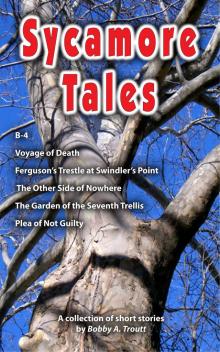 Sycamore Tales
Sycamore Tales Jawbreakers, Bubble Gum and Stick Candy
Jawbreakers, Bubble Gum and Stick Candy Stepping Out on a Limb
Stepping Out on a Limb In the Light of Day
In the Light of Day Still Wind, Forgotten Days
Still Wind, Forgotten Days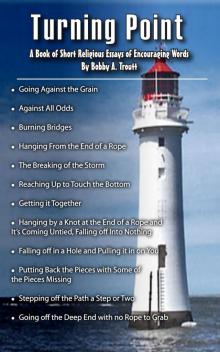 Turning Point
Turning Point Odds n Ends
Odds n Ends Giggle Book Three
Giggle Book Three Beyond The Truth
Beyond The Truth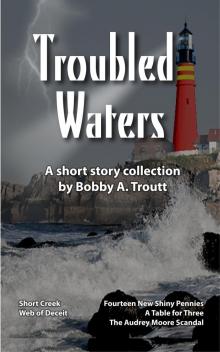 Troubled Waters
Troubled Waters Socks Without Matches
Socks Without Matches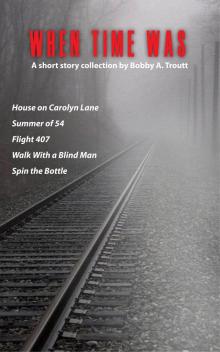 When Time Was
When Time Was Giggle's Holiday Book
Giggle's Holiday Book Giggle Book Two
Giggle Book Two Tickle Box
Tickle Box Dead Limbs and Leaves
Dead Limbs and Leaves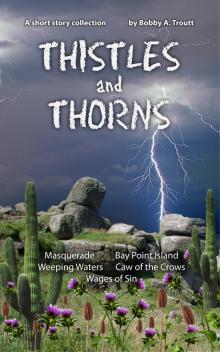 Thistles and Thorns
Thistles and Thorns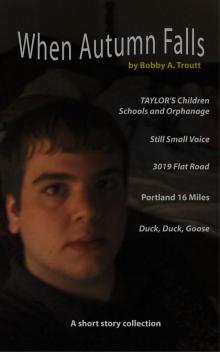 When Autumn Falls
When Autumn Falls A Cry in the Wind
A Cry in the Wind Leftover from the Holidays
Leftover from the Holidays The Fall of Autumn
The Fall of Autumn The Fall of Night
The Fall of Night Giggle Book Four
Giggle Book Four